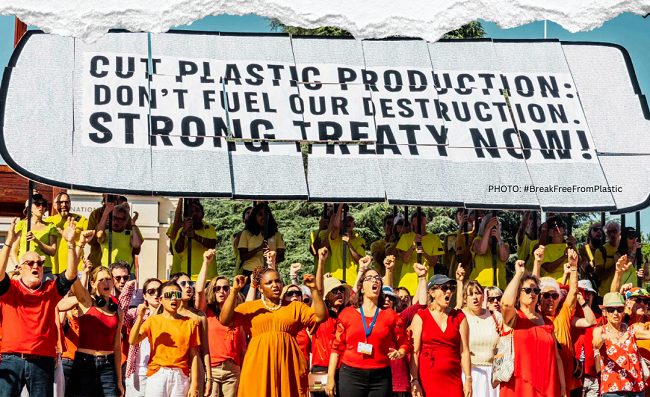As the second part of the fifth session of the Intergovernmental Negotiating Committee (INC-5.2) for the Global Plastics Treaty adjourned without consensus on Friday, August 15, environmental justice organisation, BAN Toxics, joins “ambitious countries” and civil society groups in affirming that “no treaty is better than a weak treaty.”
The deadlock stemmed largely from a draft treaty text introduced on August 13 by INC Chair Ambassador Luis Vayas Valdivieso of Ecuador, which was swiftly rejected by delegates from nearly 200 countries for failing to reflect core demands. The proposal lacked key provisions that ambitious countries and communities have consistently pushed for since negotiations began.

It omitted any mention of “chemicals” or “reuse systems,” excluded measures to cut plastic production, and contained weak language on human health, just transition, and human rights. Moreover, it removed provisions that would allow countries to vote when consensus cannot be reached during the Conference of the Parties, a gap that risks undermining future progress during implementation.
“INC-5.2 was expected to be a decisive step in what should be a historic opportunity to deliver a strong, legally binding agreement to end plastic pollution across its full life cycle. However, instead of meaningful progress, the process fell into disarray as powerful fossil fuel and petrochemical interests – backed by like-minded petro-states – moved to derail negotiations and weaken the treaty,” said Jam Lorenzo, Deputy Executive Director of BAN Toxics.
“We are extremely disappointed by the Chair’s text and its blatant disregard for the protection of human health and the environment. It disrespects three years of negotiations by pushing forward a proposal that does not reflect the will of the majority,” Lorenzo added.
According to the Center for International Environmental Law (CIEL), at least 234 fossil fuel and chemical industry lobbyists were registered at INC-5.2 – outnumbering the combined delegations of the 70 smallest participating countries. Civil society groups including Break Free From Plastic (BFFP) and GAIA warned that such industry dominance risks weakening the treaty by blocking ambition on production cuts and chemical controls.
BAN Toxics, which participated in INC-5.2 as part of the GAIA Asia-Pacific delegation, maintains that a strong treaty must deliver lasting solutions by reducing plastic production at its source, eliminating toxic chemicals, providing fair financial support for countries needing resources to meet treaty obligations, and ensuring a just transition for affected communities, especially waste pickers, fenceline communities, and Indigenous Peoples.
As an advocate for the environmentally-sound management of chemicals and waste, the group emphasised that toxic chemicals in plastics must be addressed as a core element of the treaty. Citing data from PlastChem, which found that more than 16,000 chemicals are used in plastic materials but comprehensive information exists for only a small fraction of them, Lorenzo warned that plastics release harmful chemicals throughout their entire life cycle – from raw material extraction to disposal, highlighting the urgent need for stronger rules on chemical disclosure and traceability.
“In the context of a treaty, we are calling for two critical measures: first, full disclosure of the chemicals used in products so consumers can make informed choices about what they use every day, and second, clear information on the origins of those chemicals. Countries and industries must be held accountable for the products they manufacture,” Lorenzo added.
Meanwhile, BAN Toxics commended Philippine negotiators for standing firm on key issues, including production cuts, chemicals of concern, chemical transparency, toxics-free reuse systems, and a standalone article on health. Lorenzo emphasised that strong political will is essential for securing an ambitious treaty.
According to Lorenzo, the urgency of a robust plastics treaty is especially clear in the Philippines, where plastic waste has become a major driver of flooding. During the recent intense monsoon rains and successive storms, plastic-clogged drains turned rainfall into disaster, contributing to floods that killed at least 30 people and affected millions of residents. The Department of Health also recorded a spike in leptospirosis cases, with 3,037 reported nationwide from January to mid-July 2025, including more than 1,100 cases in just a six-week span, underscoring the public health fallout of flood-driven pollution.
Reliance on the cheapest single-use plastics, driven by widespread poverty, fuels a pervasive “sachet economy” that intensifies pollution in the country. This crisis is further compounded by the influx of imported plastic products and waste, along with high domestic production, which continue to overwhelm the country’s already strained waste management systems.
“We cannot afford a treaty that bows to industry pressure and leaves the most vulnerable populations to bear the heaviest burden. What the world needs now is a strong, ambitious, and binding plastics treaty that prioritises health, justice, and accountability. We call on the Philippine government, all parties, and civil society to hold the line and demand nothing less,” Lorenzo declared.
